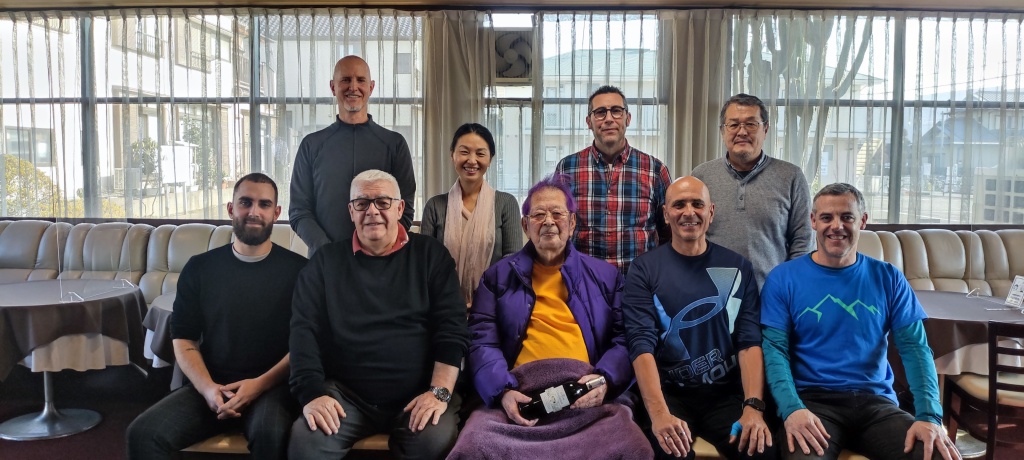
With my brother-in-arms Pedro, and a few others, we had the chance to share lunch with Sensei. During this time, he said, “this year, the important is Kannin, keep going.” (1)
There are several meanings to Kannin. Kannin refers to a period in Japanese history at the beginning of the 11th century (1017-1021). (2)
Then during the Heian Jidai, it became a generic term referring to the officials of the imperial government. (3)
When Kannin is read Kanjin, it refers to some missionary work done by the monks. (4)
When Sensei says “keep going”, he might use these various meanings simultaneously.
Like governments in times of crisis (pandemic, war), we must adapt and keep going. Our ancestors did this in the 11th century and continue to carry on their actions until this day. As Dai Shihan, we are the ”officials” of the Bujinkan. Our role is to convey the knowledge we receive from Sensei to the next generations. This is also similar to the Buddhist missionaries.
Therefore, “Keep going” is accepting that these times are challenging for everyone and that we shouldn’t give up because of the hardship in our lives. As educators, we must continue spreading the taijutsu we have received. As students, we have to be even more committed to improving ourselves. This is because times are difficult that we have to recenter our priorities.
Because of COVID, we could not come to Japan for nearly four years. I usually come here every four months. I wrote recently about the changes I noticed here due to the pandemic. Since my last trip in May 2019, Sensei’s body has become frail. And this is normal and to be expected. Sensei is a 91 years old man, his body is letting him down gradually, but his mind is as sharp as it was.
And that’s the way I understand Kannin, “keep going”. Pedro and I spent a few hours together yesterday and agreed that Sensei was happy to see us both together. It was like going back some 33 years ago when the younger us would spend the days in Sensei’s home listening and discussing with him. This lunch had this kind of flavour, and we felt it was the same for him, and it was visible on his face.
Our training halls have suffered a lot from the pandemic. We lost many students who, maybe, were not strong enough to “keep going”. Seminars are challenging to organise and attend.
Let’s regroup and build everything better. I have no worries about the old guards; they are here and as committed as before. This past week on the mats, there has been a majority of grey hair: Mark, Elias, Alex, Jasper, Ed, Andrew, Stephane, and others I don’t remember. They are all Dai Shihan, and it is logical to see them here. But we must speak to those lost in the pandemic and return them to training. This is Kannin.
You have received your orders for 2023 from the General-in-chief, and it is Kannin: keep going! Spread the news worldwide during seminars and in your dōjō. It won’t be easy, but your mission is to make 2023 a year of progress to rebuild a better Bujinkan.
Kannin!

__________________________
1. 堪忍, Kannin: patience; forbearance; endurance; tolerance; forgiveness; pardon.
2. Kannin. In Wikipedia. https://simple.wikipedia.org/wiki/Kannin
Kannin (寛仁) was a Japanese era name (年号,, nengō,, lit. “year name”) after Chōwa and before Jian. This period spanned the years from April 1017 through February 1021. [1] The reigning emperor was Go-Ichijō-tennō (後一条天皇).
3. 官人, Kannin means an official and a civil servant. In the ritsuryo system, Kannin represented officials at the rank of Sakan of Tsukasa (also known as Shi) or above and the court rank of Sixth Rank or below. In the Heian period, it meant officials at the position of Jo or below, specifically lieutenant of Konoefu (the Headquarters of the Inner Palace Guards) or under. In a narrow sense, Kannin means the officials of Shitokan and the officials at the government posts of Honkan, both of which had corresponding court ranks. In a broad sense, Kannin collectively means the officials, including Gunji and officials without corresponding court ranks.
4. 官人, Kanjin: Kanjin was work done by Buddhist monks in connection with missionary activities intended to bring relief to people.

Very affirmative and learning every day something new and nice picture I wish I was there!
LikeLike